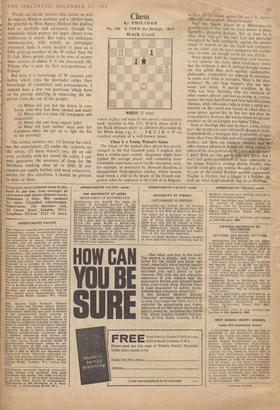Words can divide nations into classes as well as regions.
Many a careerist and a climber must be grateful to Miss Nancy Mitford for guiding him so carefully and accurately through the minefields which protect the upper classes from infiltration or attack. But today the ambitious communicator, telly pundit or newspaper columnist finds it more helpful to pass as a fully paid-up member of the W rather than the U club. More people claim to be sons of miners than cousins of dukes. It is the fourteenth Mr. Wilson who is now the first non-gentleman of Europe.
But here it is knowledge of W customs and habits which trips the pretender rather than knowledge of vocabulary and nomenclature. I append here a few test questions which have so far proved unfailing in separating the im- postor from the son of the people: .
(1) Where did you put the letters in your house after they had been opened and read?
(2) Where did you keep old newspapers and magazines?
(3) Where did you keep unpaid bills?
(4) What did your mother wear over her nightdress when she got up to light the fire in the morning?
The correct answers are: (I) behind the clock on the mantelpiece; (2) under the cushions on the settee; (3) there weren't any; (4) an old coat, probably with fur round the collar. I can only guarantee the accuracy of these for the Northern working class up to 1945. If any readers can supply further, and more exhaustive, entries for this catechism, 1 should be pleased to hear of them.
Chess
By PHILIDOR No. 158. S. LOYD (La Strategic. 1867) BLACK (3 Men) .
WHITE (7 Melt) WHITE to play and mate in two moves; solution next 'week. Solution to No. 157: R-Q 8, threat Q-Q 5. Six Black defences allow six different discoveries by the White King, e.g., I . . . P-K 5; 2 K X P--an excellent example of a well-known theme.
Chess is a Young Woman's Game The image of the typical chess player has greatly changed in the last hundred years. 1 suppose that then a middle-aged country clergyman might have typified the average player, with something more formidable (and more outré) for the champion; such, for example, as portrayed by Howard Staunton, a distinguished Shakespearian scholar, whose leonine head struck a chill in the hearts of the French sup- porters when he appeared at the Café de la Rdgence
in Paris for his match against the great St. Amant cklie chiti was justified: Staunton won.) Now the typical player is a fifteen-year-old granimar-sstool boy; and the great master is about
thirtve„ probably Russian. But at least he is ntiale. How long will this last? Can this masculine stronghold be held indefinitely against the pincers
attack of women on the one hand and computers on the other? Let me leave computers till another time—women are enough worry for one article.
Many people hold the reactionary view (correct, in my opinion, like many other reactionary views) that the evidence is that in abstract thought women are less gifted than men—quoting mathematics. philosophy, composition (as opposed to execution) in music and chess as examples. What is the chess evidence? By and large • women's play has been worse and duller. A partial exception in the 1930s was Vera Menchik, who far outshone all other women players and was as strong as a.minor master; she twice beat Euwe and twice beat Sir George 'Thomas, while Alexander (who is rather a rabid anti- feminist on this issue) was forced to admit that of seven games against her he lost two ar.d drew the remaining five. Even so, she was far below the greatest masters-as far as Lenglen was below Tilden.
Now at Hastings this year we have a new female star—the twenty-two-year-old world champion, Nona Gaprindashvili, a Georgian who is probably already better than Vera Menchik and will certaialy improws
further; and there .are ominous rumours that the
older women players in Russia am being routed by others of the new gcncratiob.W.:i wey beat the men?
I don't think so—the gap As stel'Very great; but I
don't feel quite as confident of male superiority as the young American prodigy Bobby Fischer, who said he could give any woman the odds of a knight. As one of the (male) Russian masters —commented, 'Fischer is Fischer, but a knight is a knights' We shall see what Gaprindashvili can do at Hastings.






























 Previous page
Previous page